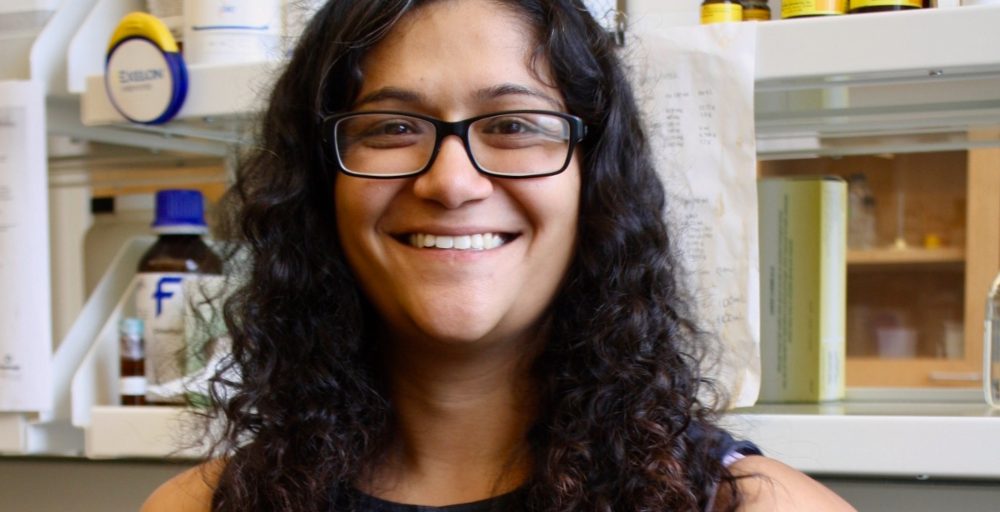SciComm to the Rescue: Using Science Communication Instruction to Improve Undergraduate Science Literacy Skills
Angel Kaur, assistant professor of neuroscience at the University of North Carolina Asheville, understands that delivering scientific jargon can lead to dull stares and confusion from audiences. Dry presentations, lack of visuals, and complicated terminology can discourage a listener and cause misunderstandings. Throughout the COVID-19 pandemic, Kaur observed how a lack of clear and engaging science communication has led to misinformation and confusion amongst audiences worldwide, especially in the US. In response, she is developing a teaching curriculum for faculty to use in order to improve a student’s science literacy skills in a single semester. The concept was submitted to the National Science Foundation (NSF) and awarded a $300k grant to develop over the next three years.
“Greater scientific literacy in the general population is critical to successfully navigating global crises such as the ongoing COVID-19 pandemic and worsening climate change,” says Kaur. “By training incoming generations of scientists, politicians, and educators in effective science literacy and communication, we can address pressing global issues by improving the way information and policies are delivered to the general population.”
Angel Kaur (PI), along with UNC Asheville professors Evan Couzo, associate professor of STEM education (co-PI), Jessica Pisano, lecturer of English (co-PI), and Becky Sanft, associate professor of mathematics (co-PI), were awarded an Improving Undergraduate STEM Education (IUSE) grant from the National Science Foundation. The project team, which also includes advisor Sally Wasileski, professor of chemistry; project evaluator Libby Pascoe, associate professor of psychology; and collaborator Lindsay Masland, associate professor of psychology and interim director of the Center for Academic Excellence at Appalachian State University, will meet over the next three years to study and scale “SciComm to the Rescue: Using Science Communication Instruction to Improve Undergraduate Science Literacy Skills.”
Over the next three years, 15 UNC Asheville STEAM (Science Technology Engineering, Arts, and Mathematics) faculty members will come together to learn effective science literacy and communication techniques to extend along to their students. The application period for the inaugural cohort of five faculty members opens on January 18, with the initial paid professional development training class meeting over two weeks in late May-early June 2022.
By applying the Self Determination Theory principles of autonomy, competence, and relatedness, and crafting a curriculum that meets the needs of the theory, Kaur hopes to prove that a student can attain a positive shift towards effective science and literacy communication in a single semester. Says Kaur, “The proposed work is grounded in Self-Determination Theory (SDT) which posits that meeting learners’ psychological needs of autonomy (the ability to make value-matched choices), competence (belief and confidence in the ability to complete relevant tasks), and relatedness (a sense of community and belonging) can positively impact their intrinsic motivation and psychological wellness, leading to increased engagement, academic achievement, and long-term retention of skills and knowledge.” With the support of the NSF grant, Kaur and her colleagues will be able to implement activities that will bolster and add to existing knowledge regarding methods of teaching practical science literacy skills to undergraduate students.
With science communication becoming more and more necessary to connect with the general public, Kaur started teaching effective science communication to first-year UNC Asheville college students in fall 2020. In her “Science Communication” course, Kaur instills in her students that the presentation of scientific information can be just as important as the information being presented. She often finds herself asking her students to consider their delivery when explaining their scientific findings: pick a question, pick an audience, and develop a mode of science communication while giving agency with structure. By turning up the creativity, students develop an internal motivation leading to greater completion, retention, and well-being while also reaching a greater audience.
“The teaching intervention at the core of this work is the semester-long SciComm UnEssay project, which asks students to pick a course-related question they’re interested in, delve into the scientific literature to find the answer, and then share that answer to an audience of their choice in a format that would be effective for that audience,” says Kaur. “Examples of UnEssay formats created by students include podcasts, pamphlets, storybooks, and more. I’ve used this project in several courses across the curriculum, and students consistently show greater engagement and creativity in this project than any I’ve tried – all while gaining important science literacy and communication skills!” She continues, “I’m excited to help fellow faculty at UNC Asheville bring this project to their classrooms to improve these vital skills across our campus.”
The application period for UNC Asheville faculty begins January 18 and ends February 25. CLICK THIS LINK for more information.
To learn more about Angel Kaur, visit clubkaur.com for ponderings and podcasts.

Share
Permalink: